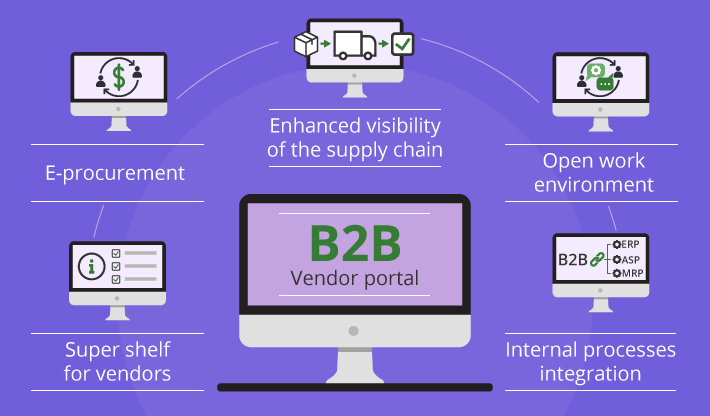04 Jan

A B2B Vendor Portal is an essential tool in modern business operations, designed to streamline the interactions between companies and their suppliers. This digital platform simplifies various aspects of business procurement and supply chain management, enhancing efficiency and transparency in vendor relationships. Through the portal, businesses can effectively manage their interactions with suppliers, ensuring smoother operations and improved communication. This article will set the stage for a deeper exploration into the functionalities and benefits of B2B Vendor Portals. Let’s do a more detailed review.
What is a B2B Vendor Portal?
The B2B Vendor Portal is a tool that will make the communication between your company, vendor, and suppliers healthier and make it easier for you to choose the right vendor. This tool will help you make more profitable investments and the right decisions. International companies and employees know better vendor management, which is essential for foreign trade. Because, in some cases, the wrong transfer of information can lead to communication problems. To eliminate such problems, we recommend you use the B2B Vendor Portal.
Benefits of Proper Vendor Management
Proper vendor management is a key component in the success of any business, playing a vital role in optimizing operations and enhancing overall performance. Here are the key points highlighting its importance:
- Cost Efficiency: Effective management helps negotiate better deals, reduce costs, and maximize value from vendor relationships.
- Quality Control: By maintaining high standards and consistent monitoring, businesses can ensure the quality of products and services received from vendors.
- Risk Mitigation: Proper vendor management identifies and addresses potential risks, such as supply chain disruptions or non-compliance with regulations.
- Strong Relationships: Building and maintaining positive relationships with vendors leads to improved communication, trust, and reliability.
- Market Responsiveness: A well-managed vendor base allows businesses to adapt to market changes and customer demands quickly.
- Innovation and Growth: Collaborating closely with vendors can lead to innovation, as vendors often bring new ideas, products, and technologies to drive business growth.
Why is the B2B Vendor Portal So Important?
The B2B Vendor Portal is crucial in managing the complexities of global online trade, especially for rapidly growing companies with a surge in orders and the need for new suppliers. Here’s a condensed overview of its importance:
- Streamlined Vendor Selection: The portal simplifies choosing the right vendors and suppliers, offering solutions for agreement formation and vendor selection.
- Integration with B2B Loyalty Solutions: Using the right software with the B2B Vendor Portal is essential. B2B Loyalty Software helps in selecting suitable vendors through the portal.
- Automated Vendor Comparison: The portal features automatic bidding tools, allowing businesses to compare vendors based on reputation and efficiency, ensuring the best deals and fair pricing.
- Vendor Performance Analysis: It analyzes vendor performance and presents these insights in a single application, eliminating the need for manual analysis.
- Contract Assistance: The portal aids in drafting appropriate contracts, ensuring clarity, and preventing potential partnership breakdowns.
- Transparency and Record Keeping: Changes on the portal are visible to all parties, promoting transparency and eliminating the need for private records.
- Management of Multiple Vendors: As the business expands, the portal, along with B2B Loyalty Software, helps manage multiple vendor relationships through reminders and notifications, ensuring control and organization.
The B2B Vendor Portal is vital for managing vendor relationships, offering solutions from selection to contract management, and ensuring efficient, transparent, and controlled business operations.
Key Phases in Effective Vendor Management Systems
Effective vendor management systems (VMS) are pivotal in optimizing business operations. These systems involve several critical stages, each contributing to a streamlined and efficient vendor management process:
- Vendor Selection: This initial stage involves identifying and evaluating potential vendors based on cost, quality, reliability, and reputation. Choosing vendors that align with the company’s values and operational needs is crucial.
- Onboarding and Integration: Once vendors are selected, the next step is their integration into the business’s systems and processes. This includes setting up communication channels, sharing relevant data, and aligning expectations.
- Performance Monitoring: Continuous monitoring of vendor performance is essential. This involves tracking delivery times, product quality, agreement compliance, and overall service levels. Regular assessments help in identifying areas for improvement.
- Relationship Management: Building and maintaining a positive relationship with vendors is key. This includes regular communication, addressing concerns promptly, and working collaboratively to resolve issues.
- Evaluation and Optimization: The final stage involves evaluating the overall effectiveness of the vendor relationship. This includes analyzing cost-effectiveness, the impact on business operations, and identifying opportunities for optimization or renegotiation of terms.
What to Look Out For in a B2B Vendor Portal
When selecting a B2B Vendor Portal, there are several key features to consider to ensure it meets your business needs effectively:
- User-Friendly Interface: It should have an intuitive design, making it easy for users to navigate and complete tasks efficiently.
- Comprehensive Vendor Management: It should offer robust tools for managing vendor information, performance metrics, and communication, streamlining the entire vendor relationship lifecycle.
- Integration Capabilities: The portal must seamlessly integrate with existing business systems (like ERP or CRM) to ensure smooth data flow and reduce manual data entry.
- Real-Time Analytics and Reporting: Access to real-time data and customizable reports is crucial for making informed decisions and monitoring vendor performance.
- Secure Data Management: Strong security protocols are essential to protect sensitive information and comply with data privacy regulations.
- Customization and Scalability: The portal should be adaptable to specific business needs and scalable to accommodate business growth.
- Automated Processes: Features like automated invoicing, order management, and contract renewals can significantly increase efficiency and reduce errors.
- Collaboration Tools: The platform should facilitate easy communication and collaboration between your business and its vendors.
- Mobile Accessibility: A mobile-friendly or app-based interface ensures access to the portal anytime, enhancing flexibility and responsiveness.
- Support and Training: Adequate support and training resources are necessary to ensure smooth implementation and user adoption.
To Get to Know Apex Loyalty a Little Better
It is a completely cloud-based SaaS loyalty program developed on the Salesforce.com infrastructure. In this respect, Apex Loyalty encourages continuous progress and transparency. The website has features you can customize, and user-friendly management screens allow you to create campaigns. In addition, The Rewards-Ready Loyalty Platform by Apex Loyalty allows managers to devote their valuable time to marketing.
You can reach our previous article from https://www.apexloyalty.com/successful-b2b-customer-loyalty-program-examples/











